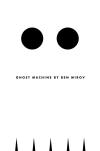Ghost Machine
In Ben Mirov’s debut poetry collection Ghost Machine, the overriding tension is the kinetic, non-reflective “I” (or sometimes “Eye”) stabbing through a list of seemingly random present-tense actions with an ADD-like attention span, overlaid with the sense of a haunting presence (or presences), creating the space of a temporal past. The randomness with which actions and thoughts take place suggests a lack of agency, but as the momentum builds it seems more that that barely-there presence is stirring – if not driving – the action.
In Ben Mirov’s debut poetry collection Ghost Machine, the overriding tension is the kinetic, non-reflective “I” (or sometimes “Eye”) stabbing through a list of seemingly random present-tense actions with an ADD-like attention span, overlaid with the sense of a haunting presence (or presences), creating the space of a temporal past. The randomness with which actions and thoughts take place suggests a lack of agency, but as the momentum builds it seems more that that barely-there presence is stirring – if not driving – the action.
The poems often use the word “ghost,” either in the poems themselves or in their titles (e.g. “Ghost Drafts,” “Ghost Dream,” “Ghost of a Morning After You Left Me,” and “Fillmore Ghost” to name but a few), and “ghost” takes on two similar but different meanings – one of an absence of what was once present (the ghost of memory), which gradually pools into a second meaning, an active specter hanging over the work. The Jack Spicer quote that serves as the epigraph is instructive: “The ghosts the poems were written for are the ghosts of the poems. We have it second-hand. They cannot hear the noise they have been making.” Perhaps something so circuitous cannot necessarily be instructive, but it at least creates a Zen-like frame of mind that stays with the reader throughout the book.
The present-tense, almost list-like actions have both the sense of being in the moment, of happening now, and of having already happened – an archive:
I spend all day looking at other people’s writing. Is this a blithe
gash that was intended? I grab a case of Bud. He hits me in the
head and I turn around. I see Taquiera in red neon. Flying over
the city, Jared lets me steer. I can’t try on jackets anymore.
Even though I know she’s not the one, I think of us on a bike.
I can’t catch Joseph and Bella jumps on my back and this means
something. I cut up missionary pamphlets to make a collage.
The tactility and surface-level rendition of San Francisco grounds the speaker (and the reader) in a specific place and time. Though the actions are so random and do not necessarily make a chronological narrative, it is not hard to follow, and in fact Ghost Machine is a pretty quick read – no mean feat for a poetry book. One gets a sense that the poems are memories with all reflection scooped out.
The relentless forward momentum makes it all the more apparent as one reads that what is in the mind of the speaker lies in the past: “We work in a room with the blinds down. You can eat pizza all the time.” And more directly: “Other times, I wonder what he’s like in bed.”
There are seven different book sections (each about 6-10 pages long), which are all slightly different: In section three, for example, the first person “I” is replaced by “Eye” in every instance – bringing into sharper relief the idea of surface and object. While the sections have nominally different forms, functionally they tend to be the same kind of poem over and over. Mostly the poems are prose poems, and when they are not, they feel like prose poems, terse and muscular (not that all prose poems are like this). All the poems have the same sort of movement; they do the same sort of thing. This gives us the sense that we are looking at a book-length poem, which has the effect of relaxing a reader’s inclination to grasp at meaning and interpretation at each turn. There is a little less interest here for a novelistic sense of pacing per se (as in, say, Farrah Field’s poetry book Rising), and more the sense of a palimpsest.
As the book continues, certain phrases start reappearing over and over (“I forget to lock up the knives,” “they have office-sex”), which suggest, at least formally, the repetition of Ted Berrigan’s sonnets. Along with lines like “I can’t believe my life was like this / three years ago,” we see also how the restless present-tense actions move forward only to the boredom and ennui that Mirov is good at evoking. This tension of being nostalgic for the present (or recent past), while also being under no illusion that that time has its share of tedium and unproductive action, is the purview of Mirov, and is the catalyst for the drama of his work.




